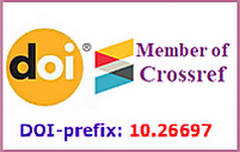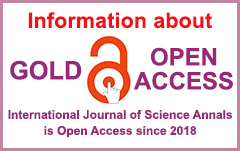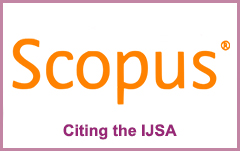Social Identification’s Role for Work and Family Life Balance
Issimova A. E. 1
| 1 National Defense University named after the First President of the Republic of Kazakhstan – Yelbasy, Kazakhstan |
Abstract
Background and Aim of Study: The research work considers whether workplace stress had a negative association with university teacher’s family functioning, and if a social identification might a moderator role for this relationship. The aim of the study: to define the social identification’s role for work and family life balance.
Material and Methods: The data were collected from participants (university teachers) with the scales (Perceived Stress Scale; Brief Family Relationship scale and The Three-Dimensional Strength of Group Identification scale) of multiple – choice questionnaire. Moderation analysis was conducted by using multiple linear regression analysis.
Results: Author concludes that the impact of workplace stress on family functioning is dependent on individual’s social identification level with their family group. It is because the bivariate analysis results showed that workplace stress was a negatively affected to the family functioning (p<0.05). Moderation analysis indicated that the impact of workplace stress on family functioning is dependent on individual’s social identity level with their family members. The interaction between social identification and workplace stress was significant (p<0.05), that means social identification moderated the relationship between workplace stress and family functioning. Workplace stress would not negatively effect on family functioning (p>0.05) that individual’s whose social identification with their family was high. In contrast, lower identification with family had more significant negative impact from workplace stress on their family functioning.
Conclusions: Social identification plays a significant effect for individual’s work and family life balance. Individual’s high social identification with their family is an effective coping method with workplace stress and, moderates the relationship between workplace stress and family functioning.
Keywords
workplace stress, family functioning, coping, social identification.
References
Avanzi, L., Fraccaroli, F., Castelli, L., Marcionetti, J., Crescentini, A., Balducci, C., & Dick, R. (2018). How to mobilize social support against workload and burnout: the role of organizational identification. Teaching and Teacher Education, 69, 154–167. doi:10.1016/j.tate.2017.10.001
Baider, L., Ever-Hadani, P., Goldzweig, G., Wygoda, M. R, & Peretz, T. (2003). Is perceived family support a relevant variable in psychological distress? A sample of prostate and breast cancer couples Journal of Psychosomatic research, 55(5), 453–460. doi:10.1016/s0022-3999(03)00502-6
Barnett, R. C., & Baruch, G. K. (1985). Women’s involvement in multiple roles and psychological distress. Journal Personal Social Psychology, 49(1), 135–145. doi:10.1037//0022-3514.49.1.135
Beck, A. (1984). Cognitive approaches to stress. In R. L. Woolfolk, & P. M. Lehrer (Eds), Principles and Practices of stress management (pp. 255–305). New York: Guilford.
Billings, A., & Moos, R. (1982). Work stress and the stress-buffering roles of work and family resources. Journal of Occupational Behaviour, 3, 215–232. doi:10.1002/job.4030030303
Cameron, J. (2004). A three factor model of social identity. Self and Identity, 3(3). 239–262. doi:10.1080/13576500444000047
Cohen, S., & Kamarck, T. (1994). A global measure of perceived stress. Journal of Health and Social Behaviour, 24(4), 385–396.
Ellemers, N., Koetekaas, P., & Ouwerkerl, J. (1999). Self-categorization, commitment to the group and group self-esteem as related but distinct aspects of social identity. European Journal of Social Psychology, 29, 371–389.
Endler, N. S., & Magnusson, D. (1976). Toward an interactional psychology of personality. Psychological Bulletin, 83(5), 956–974. doi:10.1037/0033-2909.83.5.956
Fok, C. C., Allen, J., Henry, D. & Team, P. A. (2014). The brief family relationship scale: A brief measure of the relationship dimension in family functioning. Sage Journals, 21(1), 67–72. doi:10.1177/1073191111425856
Haslam, S. A, O’Brien, A., Jetten, J., Volmedal, K., & Penna, S. (2005). Taking the strain: social identity, social support and the experience of stress. British Journal Social Psychology, 44(3), 355–370. doi:10.1348/014466605X37468
Haslam, S. A., & Reicher, S. (2006). Stressing the group: Identity and the Unfolding Dynamics of responses to stress. Journal of Applied Psychology, 91(5), 1037–1052. doi:10.1037/0021-9010.91.5.1037
Kiecolt-Glaser, J. K, Malarkey, W. B., Chee, M., Newton, T., Cacioppo, J. T., Mao, H. Y., & Glaser, R. (1993). Negative behavior during marital conflict is associate with immunological down-regulation. Psychosomatic Medicine, 55(5), 395–409. doi:10.1097/00006842-199309000-00001
Klink, J. L., Byars-Winston, A., & Bakken, L. L. (2008). Coping efficacy and perceived family support: potential factors for reducing stress in premedical students. Medical Education, 42(6), 572–579. doi:10.1111/j.1365-2923.2008.03091.x
Lazarus, R. S., & Folkman, S. (1984). Stress, appraisal and coping. New York: Springer Press.
Magnusson, D., & Endler, N. S. (1976). (Eds). Personality at the cross-roads: current issues in interactional psychology. New York: Halsted Press.
Melnyk, Yu. B., & Pypenko, I. S. (2018). Training of future specialists in higher education institutions. International Journal of Science Annals, 1(1-2), 4–11. doi:10.26697/ijsa.2018.1-2.01
Melnyk, Yu., & Stadnik, A. (2018). Mental health of a personality: diagnostics and prevention of mental disorders. International Journal of Education and Science, 1(3-4), 50. doi:10.26697/ijes.2018.3-4.37
Pennebaker, J. W. (1982). The psychology of physical symptoms. New York: Springer-Verlag.
Pleck, J. H. (1985). Working wives/working husbands. Beverly Hills, CA: Sage.
Rosalind, C., Lois, B., & Grace, B. K. (1987). (Eds). Gender and stress. London: Collier Macmillan.
Seiffge-Krenke, I., Aunola, K., & Nurmi, J. (2009). Changes in stress perception and coping during adolescence: The role of situational and personal factors. Child Development, 80, 259–279. doi:10.1111/j.1467-8624.2008.01258.x
Taifel, H. (1978). Social categorization, social identity and social comparison. In H. Taifel (Ed.), Differentiation between social groups: Studies in the social psychology of ingroup relations (pp. 61–76). London: Academic Press.
Taifel, H., & Turner, J. C. (1979). An integrative theory of intergroup conflict. In W. Austin, & S. Worchel (Eds.), The social psychology of intergroup relations (pp. 33–37). California: Brooks/Cole.
Wang, Sh., Repetti, R., & Campos, B. (2011). Job stress and family social behavior: the moderating role of neuroticism. Journal of Occupational Health Psychology, 16(4), 441–456. doi:10.1037/a0025100
Zellars, K. L., & Perrewé, P. L. (2001). Affective personality and the content of emotional social support: Coping in organizations. Journal of Applied Psychology, 86(3), 459–467. doi:10.1037/0021-9010.86.3.459
Information about the author:
Issimova Ainash Esengeldievna – https://orcid.org/0000-0003-4111-1164; Doctor of Philosophy in Pedagogy, Senior Researcher, National Defense University named after the First President of the Republic of Kazakhstan – Elbasy; Nur-Sultan, Kazakhstan.
Cite this article as:
APA
Issimova, A. E. (2019). Social Identification’s Role for Work and Family Life Balance. International Journal of Science Annals, 2(1-2), 34–39. https://doi.org/10.26697/ijsa.2019.1-2.05Harvard
Issimova, A. E., 2019. "Social Identification’s Role for Work and Family Life Balance". International Journal of Science Annals, [online] 2(1-2), pp.34–39. viewed 30 November 2019, https://culturehealth.org/ijsa_archive/Vol._2,ijsa_No_1-2,_2019-5.pdfVancouver
Issimova A. E. Social Identification’s Role for Work and Family Life Balance. International Journal of Science Annals [Internet]. 2019 [cited 30 November 2019]; 2(1-2):34–39. Available from: https://culturehealth.org/ijsa_archive/Vol._2,ijsa_No_1-2,_2019-5.pdf https://doi.org/10.26697/ijsa.2019.1-2.05












